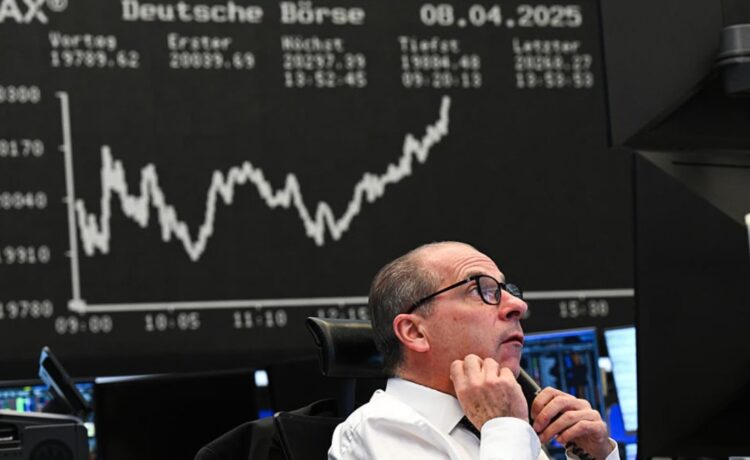This was CNBC’s live blog covering European markets.
European stocks closed sharply lower on Wednesday, with Tuesday’s market rebound proving short-lived as the U.S.’ country-specific tariffs started taking effect.
The pan-European Stoxx 600 index ended the session down 3.5% at its lowest closing level since January 2024, with all sectors and major bourses firmly in negative territory. Regional health care and oil and gas indexes were among the biggest losers, plummeting 5.9% and 5%, respectively.
Europe’s major indexes extended their losses after China announced it is slapping retaliatory tariffs of 84% on U.S. imports from April 10, up from 34%, and the European Union approved an initial set of trade countermeasures in response to U.S. duties on steel and aluminum. The French CAC 40 fell by 3.34%, while Germany’s DAX was 3% lower, and the FTSE 100 lost 2.9%.
European markets had closed in the green on Tuesday, snapping a four-day loosing streak. The move higher came after Asia-Pacific stocks had kicked off a global equity rebound, which U.S. stocks also initially joined before pulling back.
Unease about the fallout from U.S. President Donald Trump’s tariffs and retaliatory measures from the U.S.’ trading partners weighed on markets as concerns about more duties being announced grew and uncertainty persisted.
Trump on Tuesday suggested the U.S. would soon announce “a very major tariff on pharmaceuticals,” and tripled the previously announced tariff rates on low-value packages exported to the U.S. from China via the international postal system.
A slew of tariffs came into effect just after midnight stateside, with duties being enforced on imports from dozens of countries. The measures include a 104% tariff on Chinese imports.
Some targeted countries are expected to hit back at the United States, including Canada, which on Tuesday reconfirmed plans to impose 25% retaliatory tariffs on U.S.-made vehicles.
U.S. stocks were choppy, while U.S. Treasurys plunged and the U.S. dollar traded lower. Asia-Pacific markets also widely fell Wednesday.
— CNBC’s Christina Wilkie contributed to this report.
Bank of England may cut rates sooner than expected due to gilt market moves: Aberdeen
The Bank of England may be pushed into faster-than-expected interest rate cuts after the spread between short-term and long-term U.K. yields widened dramatically on Wednesday, Alex Everett, senior investment manager at Aberdeen, told CNBC.
U.K. long-term government bonds skyrocketed amid wider market turmoil on Wednesday as fiscal and global economic concerns weighed. The 30-year gilt yield was 25 basis points higher at 5.597% at 5 p.m. London time, at its highest level since 1998, after rising as much as 30 basis points earlier in the session. The 2-year gilt yield was up 4 basis points at 4.002%.
“Gilts have reverted to recent form, trading on global moves rather than U.K.-specific factors,” Everett said by email.
“Significant recent moves higher in yield – particularly at the long end – demonstrate continued fear as to the U.K.’s fiscal position. Pronounced curve steepening highlights the twin challenges of heavy pressure on the UK’s fiscal framework, alongside likely negative economic fallout from tariffs, at best. This may force earlier moves from the Bank of England than previously expected.”
“In a tense market environment wherein most asset classes are trading weakly, gilts are unlikely to be considered a haven asset.”
Money markets had on Wednesday fully priced in a 25-basis-point rate cut from the BOE in May to 4.25%, with a slight possibility of a bigger 50-basis-point move. Last week, the market had been split on the probability of a May cut.
— Ganesh Rao, Jenni Reid
RBC Wealth management says investors can take advantage of market volatility
Frédérique Carrier, head of investment strategy for the British Isles and Asia at RBC Wealth Management said Wednesday “an erosion of trust” in the U.S. could eventually benefit European equities.
“While uncertainty persists, we anticipate defensives to outperform, though we would take advantage of the volatility to target global leaders who shape and benefit from global megatrends in the sectors of healthcare and industrials, including defence, and technology,” she said.
— Chloe Taylor
Europe banks down 4% amid Trump’s tariffs
Europe’s banks sustained further losses as the U.S. enacted its tariffs and China took further retaliatory steps, raising concerns about the possibility of a global trade war.
Europe’s banking sector was down 4.1% at 12:56 p.m. in London, with major lenders across the region crowding the bottom of the Stoxx 600 index.
Swiss banks Julius Baer and UBS Group were down 7% and 5.7%, respectively. Barclays and HSBC shed 5.4% and 4.1%. French bank BNP Paribas was down 5%, and Danish bank Danske Bank lost 4.8%.
— Sawdah Bhaimiya
Investors flee to German bonds as Trump tariffs spark Treasury sell-off
European short-dated bond yields were broadly lower at 12:28 p.m. in London amid an ongoing sell-off in U.S. Treasurys, as market tensions increased on China’s announcement of retaliatory tariffs.
The yields on 2-year government bonds in France, Italy and Britain were 9, 6, and 4 basis points lower, respectively. The yield on Germany’s 2-year bunds dropped 12 basis points. Yields move inversely to priced.
Longer-dated European yields meanwhile ticked higher, with the U.K. 30-year yield spiking 20 basis points to a fresh 27-year high.
One exception was the German 10-year yield, which dipped nearly 2 basis points.
“Traditionally you might have gone into the U.S. during a period of volatility, but this is a U.S. story. Germany is benefiting from a wider flight to quality. The country has already told the market what it’s going to do, there’s clarity about what its path will look like,” Ken Egan, senior director for sovereigns at credit rating analysis agency KBRA, told CNBC, referencing Berlin’s recent passing of a huge fiscal package across infrastructure, climate and defense.
— Jenni Reid
China slaps retaliatory tariffs of 84% on U.S. goods in response to Trump
China has responded again to U.S. President Donald Trump’s tariff policies by hiking its levies on U.S. imports to more than 80%.
China’s Office of the Tariff Commission of the State Council said that tariffs on U.S. goods will rise to 84% from 34% starting on April 10, according to a translation of the announcement. This comes after the latest U.S. tariff hike — which brings levies on Chinese goods to more than 100% — took effect at the start of April 9.
— Jesse Pound
Higher risk of ‘adverse events’ in markets following Trump tariffs, Bank of England warns

General view of the Bank of England and the Bank of England’s Prudential Regulation Authority (PRA) in March 2025.
Risks to the global and U.K. economy have intensified as a result of Trump’s latest tariffs, the Bank of England warned, signaling a high possibility of “further sharp corrections” in markets.
“The global risk environment has deteriorated, and uncertainty has intensified. A range of risky asset prices, led by those denominated in US dollars, have declined sharply. The probability of adverse events, and the potential severity of their impact, has risen,” the British central bank said.
It further noted that the recent announcements of U.S. reciprocal tariffs alongside retaliatory measures from Washington’s trade counterparts have “contributed to a material increase in the risks to global growth and a weakening of the central outlook, as well as increased uncertainty over the outlook for inflation globally.”
Global markets were upended last week by the White House’s announcement of fresh levies introduced under Trump’s protectionist trade agenda, triggering sharp declines in equities, a surge in U.S. Treasury yields and darkening the growth outlook for the world’s largest economy.
“As the UK is an open economy with a large financial sector, global risks are particularly relevant to UK financial stability,” the Bank of England said.
— Ruxandra Iordache
Europe looks to broaden its coalition of trade partners, including China and Vietnam
EU trade official Bernd Lange told CNBC the bloc is looking to broaden its coalition of trading partners in a bid to maintain the rule-based trade order in the wake of Trump’s tariffs regime.
The European Union is expected on Wednesday to announce countermeasures to Trump’s reciprocal tariffs. The bloc, a major trading partner of the U.S., has been hit with 20% duties.
Europe is looking to negotiate with the U.S, as there are a “lot of elements where we can find some common ground,” said Lange, chairman of the European Parliament’s committee on International Trade.
Simultaneously, the EU is also looking to maintain the rule-based trade order by cooperating with a broader coalition of countries.
“We are looking to have a more broad coalition, not only with China but also with a lot of other countries like India, like Indonesia, Vietnam which are really harmed by U.S. tariffs, so that we can stabilize the rule-based trading organization and the WTO,” he told CNBC’s “Squawk Box Europe.”
— Lily Meckel
Health-care stocks lead losses

A technician at the Novartis Institutes for BioMedical Research in Cambridge, Massachusetts.
Europe’s Stoxx Healthcare index was 4.4% lower at 10:02 a.m. in London on Wednesday, paring earlier losses but still trading low enough to lead the regional equity sell-off.
Companies notching the biggest losses include Danish hearing aid manufacturer GN Store Nord, down 7.7%, and pharmaceutical giants Novartis, down 6.1%, AstraZeneca, down 5.3% and Roche, down 5.2%.
On Wednesday, U.S. President Donald Trump said a “major tariff on pharmaceuticals” is in the works. So far, pharmaceutical products have been exempted from new U.S. duties on imports.
— Chloe Taylor
BNP Paribas says tariff frenzy ‘clears path’ to ECB rate cut

The European Central Bank raises interest rates, Suqian, Jiangsu province, China, June 15, 2023.
The rollout of U.S. reciprocal tariffs will help unite policymakers at the European Central Bank on the need for further interest rate cuts, according to analysts at BNP Paribas.
In a note titled “ECB: Tariffs turmoil clears path to a cut,” analysts argued that ongoing disinflation and downside risks to economic growth should prompt a 25-basis-points cut from the central bank next week.
“While higher fiscal spending, higher trade tariffs and positive bank lending data might be arguments to pause, we think uncertainty surrounding the outlook and a recent tightening in financing conditions should resolve any policy dilemma,” they said.
BNP Paribas expects the ECB to cut its key interest rate to 2% by June.
— Chloe Taylor
Deutsche Bank downgrades swathe of European firms in tariff firing line
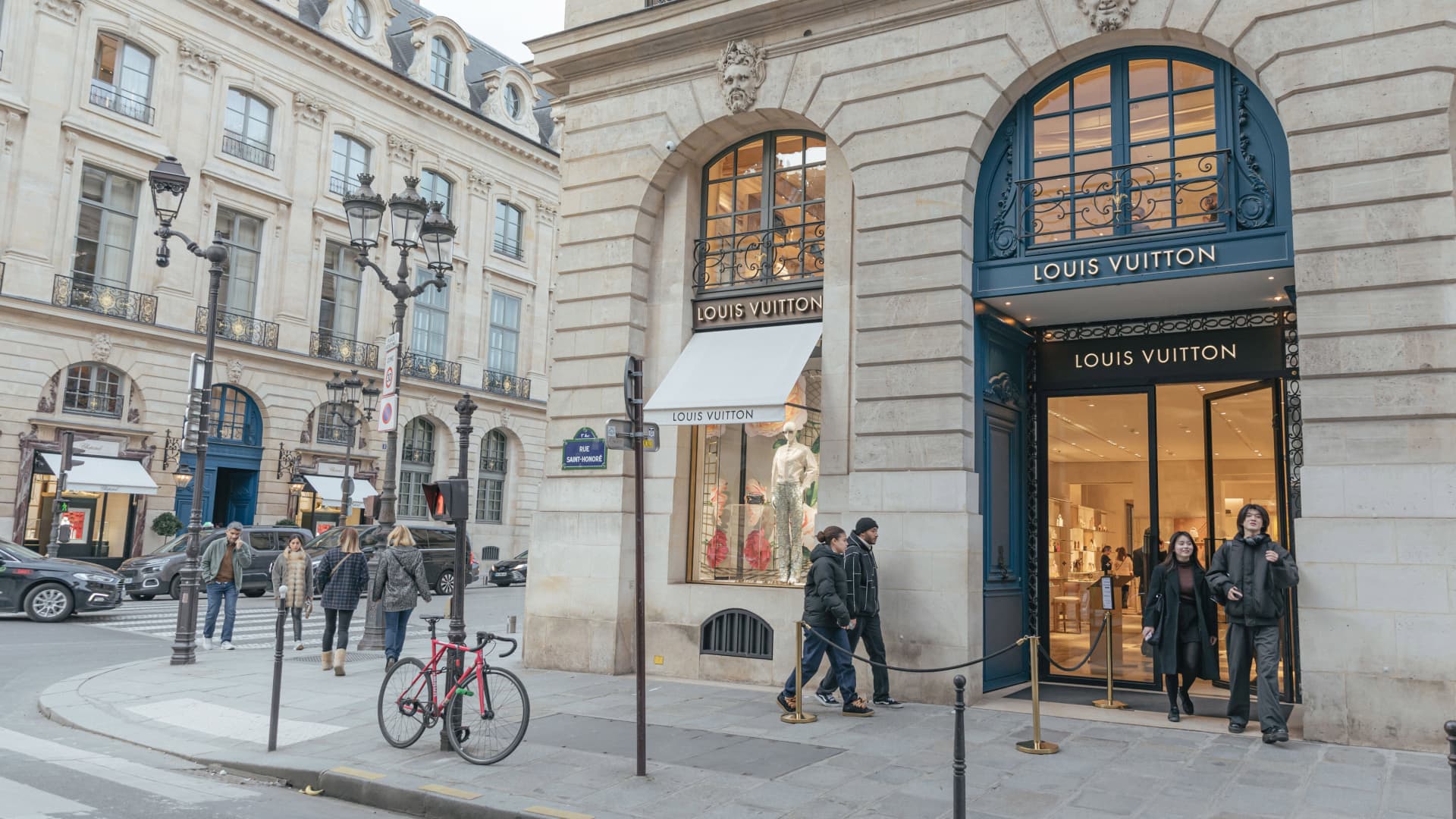
The Louis Vuitton boutique in the Place Vendome luxury retail area in central Paris, France, on Tuesday, Feb. 21, 2024.
In a note to clients on Wednesday, strategists at Deutsche Bank downwardly revised target prices for 19 companies.
Many of the companies were in the European luxury and mining sectors. Gucci owner Kering’s target price was slashed by 39.7%, while British luxury giant Burberry’s target price was lowered by 35.7%. French conglomerate LVMH’s target price was cut by 16.5%.
In the mining sector, BHP, Anglo American, Glencore and Rio Tinto were among those with downgraded target prices.
“The direct impact of the tariffs is not a huge headwind in our view with … price increases able to offset the profit impact,” Deutsche Bank’s team said in their note. “However, weaker global stock markets and the broader economic uncertainty will weigh on confidence and we see this further postponing a recovery in luxury demand.”
On mining, Deutsche Bank advised investors to “seek selective exposure” in the coming six to 12 months.
“The reciprocal tariffs announced last week have driven the sharpest sell-off in Mining since 2020,” its strategists said. “Our base case now assumes global growth verging on recession over the next two quarters … While there is still the risk of further downside in the near term, mining valuations are approaching trough levels, [and] debt levels are low.”
— Chloe Taylor
European markets open lower
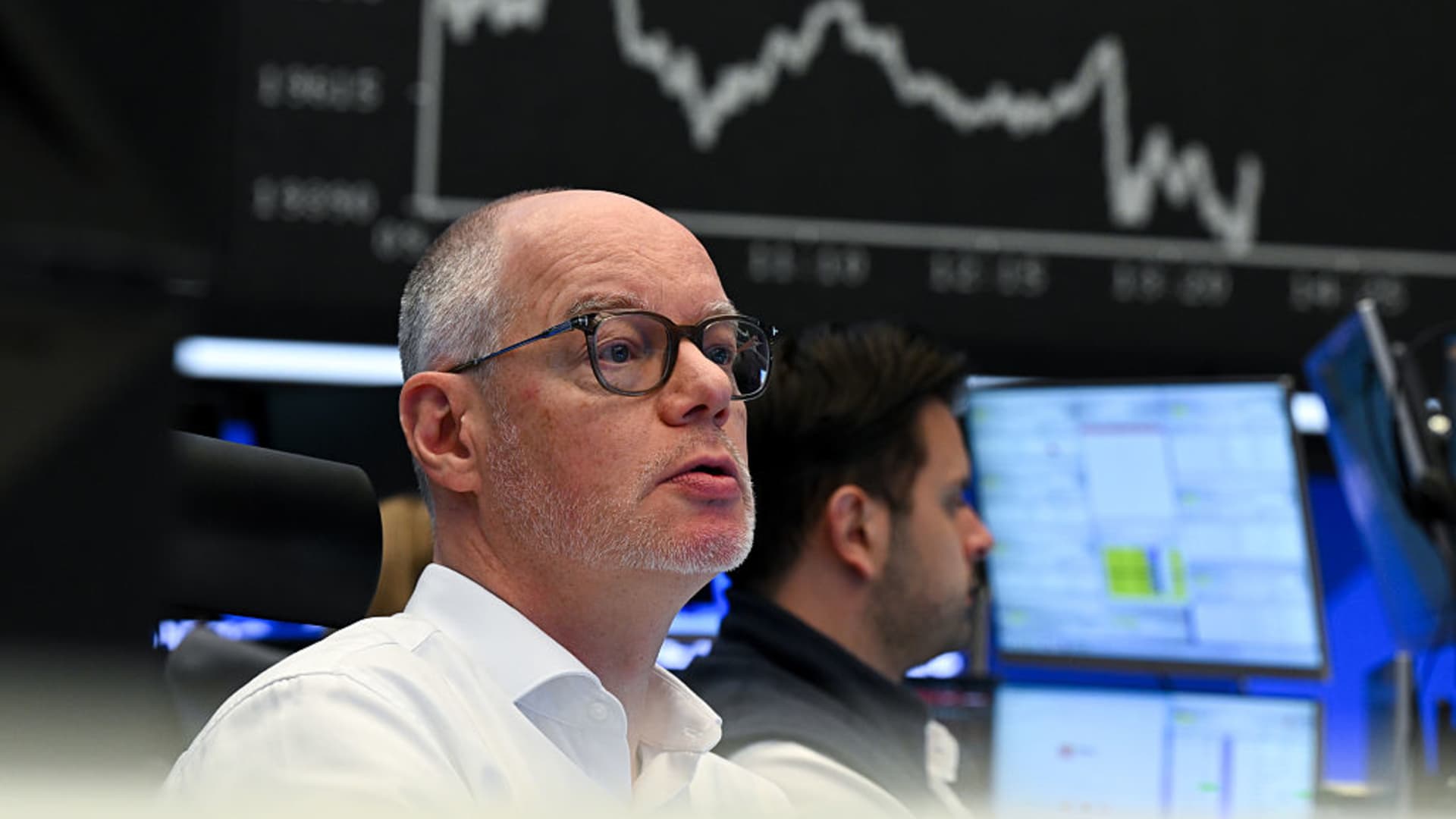
On the trading floor of the Frankfurt Stock Exchange, traders watch their monitors in front of the display board showing the Dax curve.
The pan-European Stoxx 600 was 2.7% lower shortly after the opening bell on Wednesday, with all regional sectors and major bourses firmly in negative territory.
Healthcare, autos and mining stocks led losses in Europe, with sector indexes down 4.4%, 2.5% and 2.9%, respectively.
Autos and mining companies are heavily exposed to U.S. President Donald Trump’s reciprocal tariffs, with vehicles being one of the EU’s biggest exports to the U.S. and China being hit with net total tariffs of 104%. On Tuesday, Trump said that “a major tariff on pharmaceuticals” would soon be imposed.
— Chloe Taylor
Auto giants extend losses as Trump’s sweeping tariffs take effect
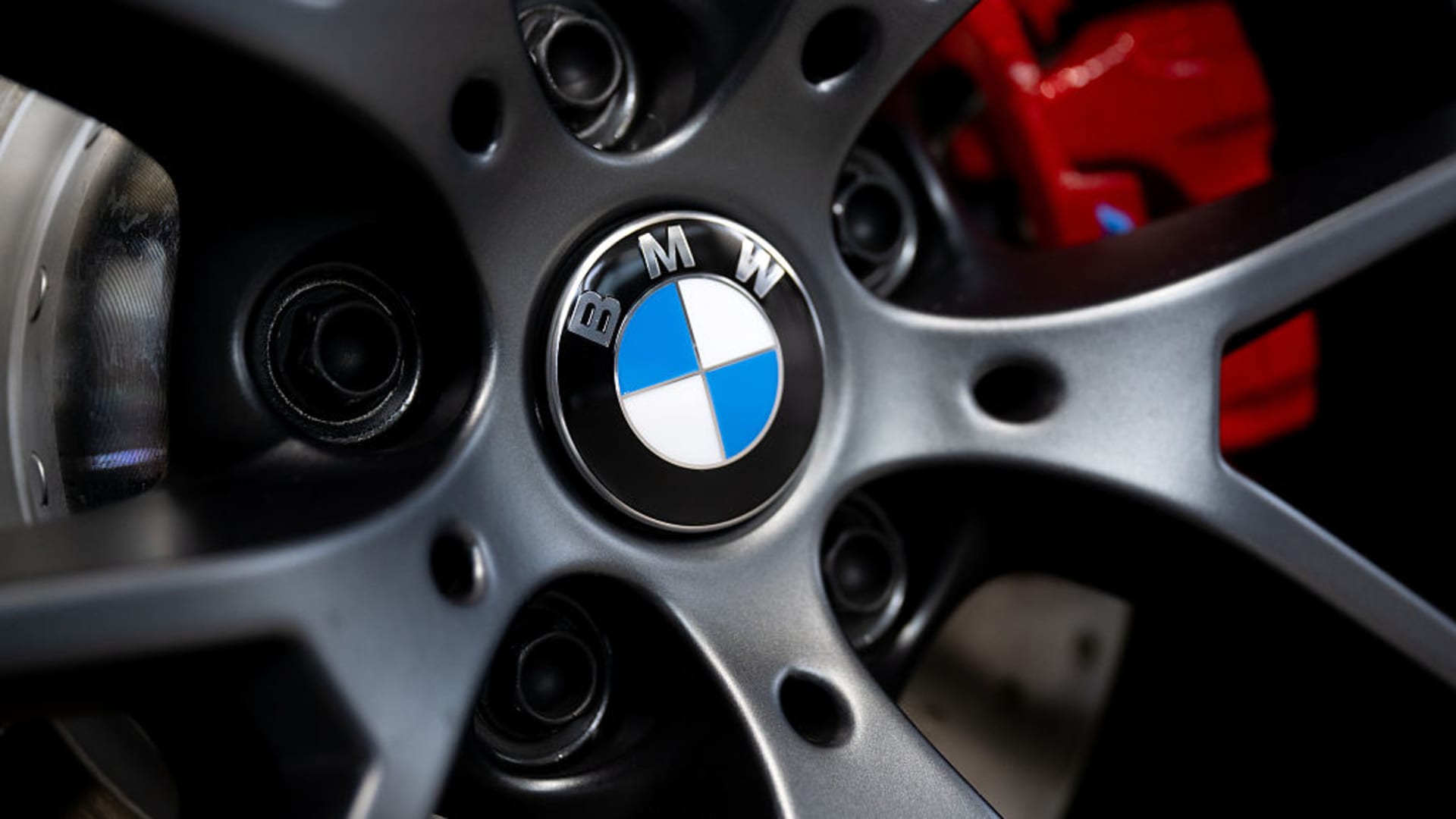
The BMW logo can be seen on a wheel rim on one of the car manufacturer’s cars.
Europe’s auto giants fell sharply on Wednesday morning, extending recent losses as Trump’s sweeping tariffs take effect.
Shares of French car parts supplier Valeo fell 7.2% shortly after the open, tumbling toward the bottom of the pan-European Stoxx 600 index.
Milan-listed Stellantis dipped 4.1%, while German automakers Porsche and BMW both traded more than 3% lower.
An escalating trade war is expected to have a profound impact on the global car industry, particularly given the high globalization of supply chains and the heavy reliance on manufacturing operations across North America.
— Sam Meredith
German short-term bonds rally
The yield on German government bonds — known as bunds — with short maturity terms fell on Wednesday morning, with investors scrambling to find safety as global equity markets resumed their sell-off.
Bond yields and prices move in opposite directions.
By 7:24 a.m. in London, the 2-year bund yield had shed 8 basis points, while the yield on 5-year bunds was 4 basis points lower. Yields on longer term bunds rose, however, with the 10-year bund, seen as a benchmark for the euro zone, adding 2 basis points. The yield on the 20-year bund added 4 basis points.
Elsewhere in Europe, bond yields rose, with French 10-year yields adding 8 basis points, Swiss 10-years gaining 7 basis points and Italian 10-year yields rising by 13 basis points.
Some U.K. government bonds, known as gilts, also bucked the trend, with the yield on 5-year gilts falling by around 2 basis points and 10-year gilt yields also moving marginally lower.
Further afield, U.S. Treasury yields surged, with 5-year and 10-year Treasury yields gaining 10 and 15 basis points, respectively, while 20- and 30-year Treasury yields jumped by around 19 basis points.
— Chloe Taylor
European pharmaceutical giants warn of ‘risk of exodus to the U.S.’
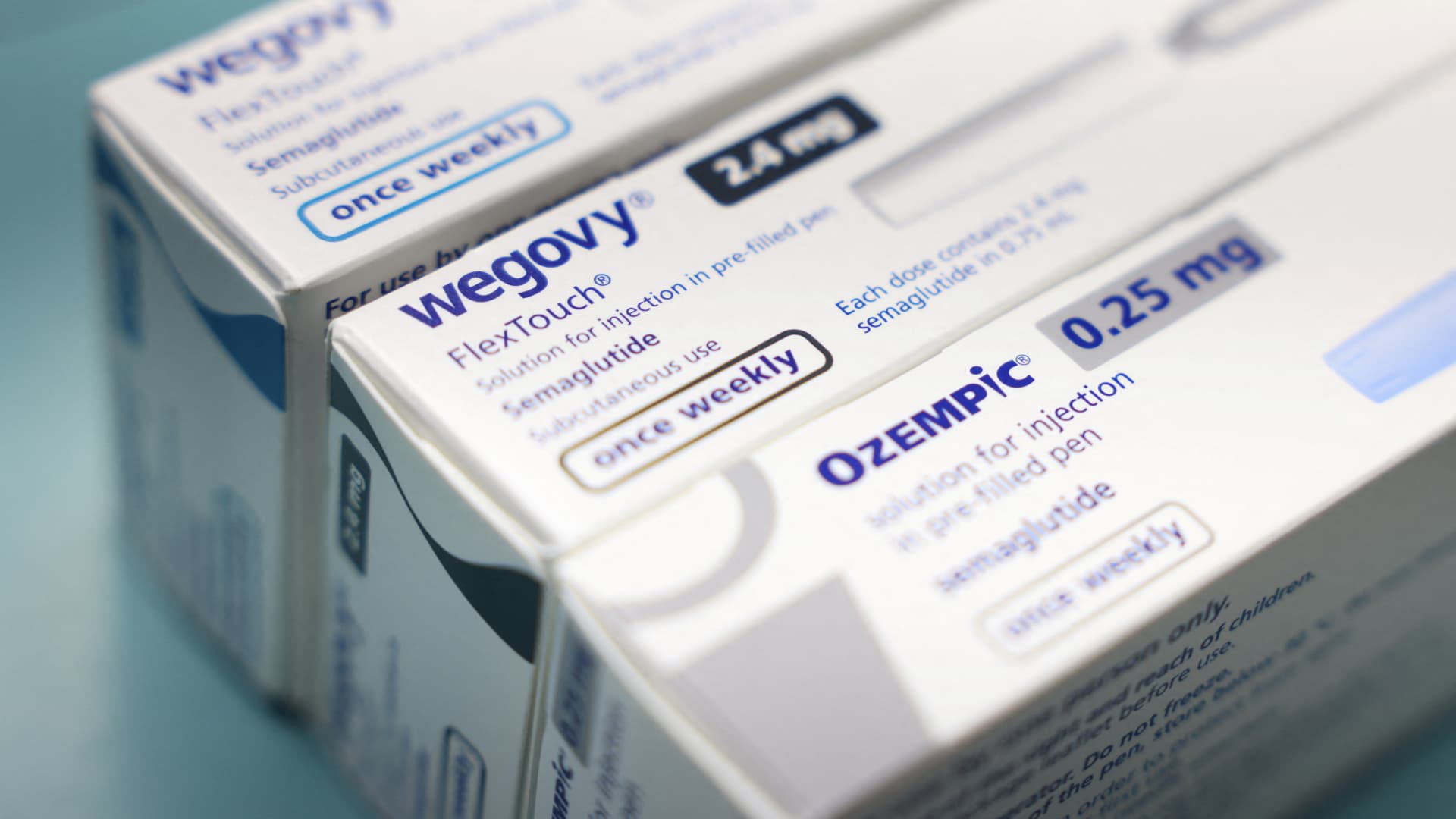
Boxes of Ozempic and Wegovy made by Novo Nordisk at a pharmacy in London on March 8, 2024.
European pharmaceutical chiefs warned on Tuesday that tens of billions of dollars are at “risk of exodus to the U.S.” without “rapid, radical policy change.”
Industry lobby group EFPIA — whose members include Novo Nordisk, Bayer and Novartis — said around 50.6 billion euros ($55.9 billion) in capital expenditure investments and 52.6 billion in research and development expenditure was at risk.
Industry CEOs polled by the organization said they wanted immediate action from the EU aimed at developing a competitive market, strengthening intellectual property provisions and implementing regulation that is “conducive to innovation.”
“Europe needs to make a serious commitment to invest in a world class pharmaceutical ecosystem, or at best, risk being reduced to a consumer of other region’s innovation,” EFPIA said in a statement.
— Chloe Taylor
European stocks head for lower open
European stocks were headed for a lower open on Wednesday after finishing the day in positive territory on Tuesday.
The U.K.’s FTSE 100 was last set to fall 187 points to 7,701, the French CAC 40 was on track to shed 232 points to 6,861, and Germany’s DAX was on course to fall 668 points to 19,581, according to IG data. Italy’s FTSE MIB was set to lose 1,379 points to 31,627.
— Sophie Kiderlin
South Korea’s Kospi enters bear market territory
South Korea’s Kospi lost 20% from its July high, confirming a bear market.
The benchmark is currently down by over 1%. Amongst the index heavyweights, SK Hynix is down over 3% and Samsung Biologics is 0.9% lower.
Just last Monday, South Korea lifted the longest short-selling ban in the country’s history, after tightening measures to crack down on illegal transactions.
—Lee Ying Shan
S&P 500 is inches from bear market territory
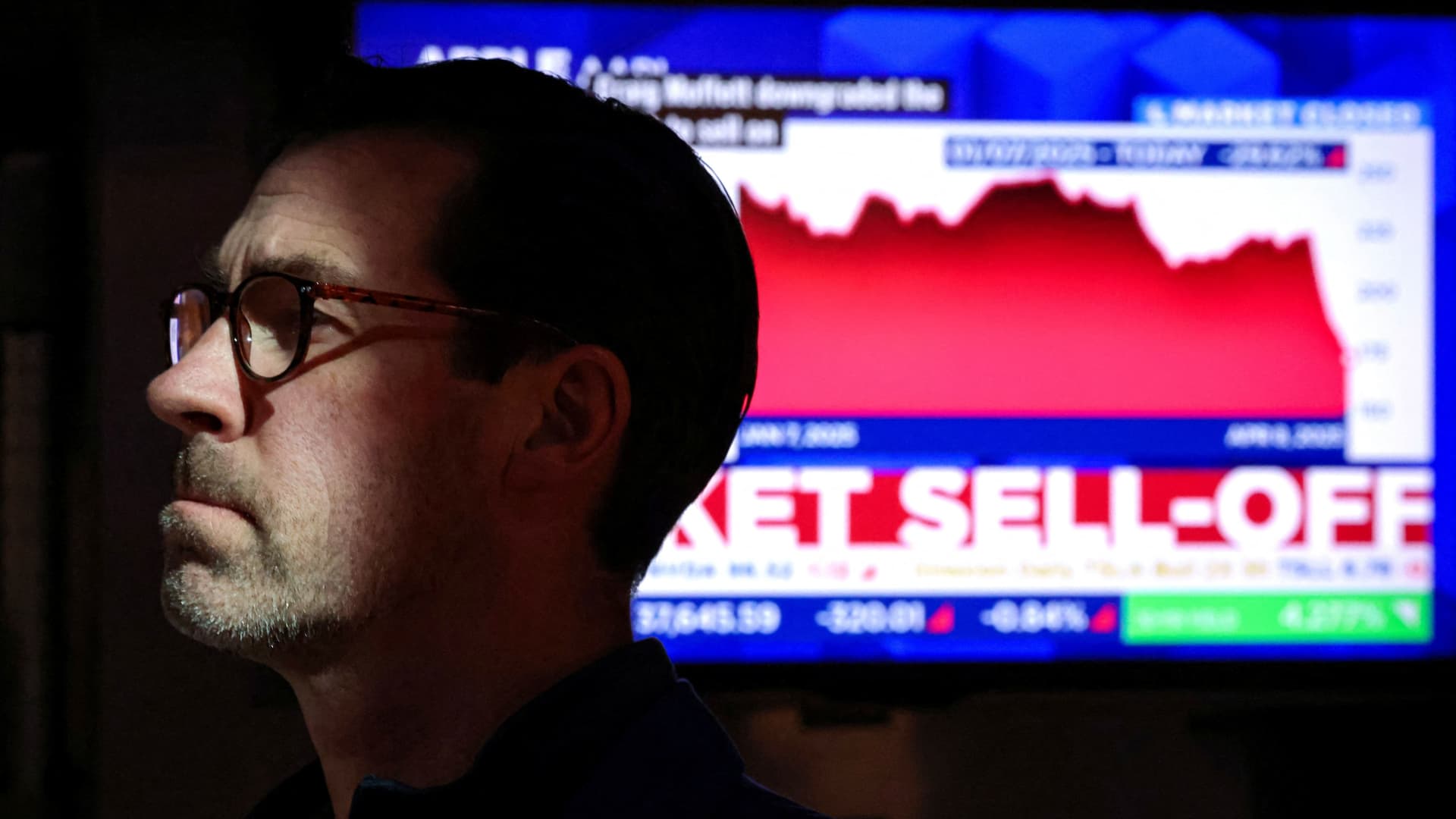
Traders work on the floor at the New York Stock Exchange in New York City, U.S., April 8, 2025.
The S&P 500’s 1.6% decline during regular trading on Tuesday has brought the broad market index nearly 19% off of its February closing record, which is just inches away from a bear market.
A decline of 20% from a previous record high constitutes a bear market on Wall Street. The index needs to slip a further 1.35% to officially enter a bear market.
— Brian Evans
Stock futures slide
Stock futures fell on Tuesday, as investors prepare for President Donald Trump’s tariffs on 86 countries, including China, that are set to take effect at midnight.
Futures tied to the Dow Jones Industrial Average fell 284 points, or 0.74%. Nasdaq-100 futures declined 0.88%, while S&P 500 futures pulled back 0.89%.
— Brian Evans

